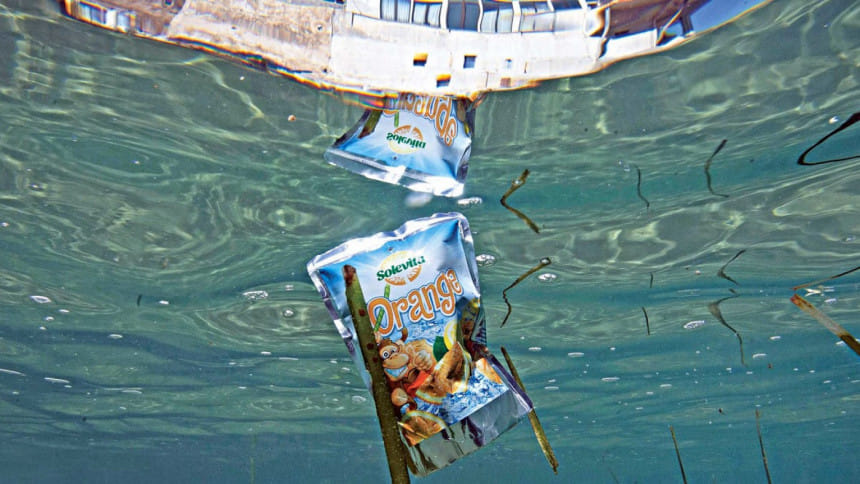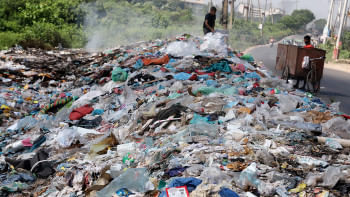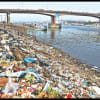What we can do to prevent plastic from taking over our seas

Plastic pollution has emerged as a global crisis, demanding immediate attention. Around the world, five trillion plastic bags are used every year, with a significant number of them being single-use. Depending on the material, these bags can take anywhere from 20 to 500 years to decompose in the soil. In Bangladesh, a densely populated nation, the consumption of plastic has surged dramatically. Between 2005 and 2021, our per capita plastic usage tripled from three to nine kilos, and in the capital, it soared to 24 kg per person. This excessive reliance on plastic not only disrupts soil fertility when discarded on land but also poses a significant threat to water navigation.
In Bangladesh, the menace of plastic pollution extends beyond urban areas, affecting coastal regions as well. Due to the absence of eco-friendly waste management practices, a substantial amount of plastic waste finds its way into the Bay of Bengal, exacting a heavy toll on marine biodiversity.
Cox's Bazar, home to one of the world's most extensive sea beaches, grapples with a dire plastic pollution crisis, exacerbated by the influx of tourists. Visitors use and dump a large quantity of plastic bottles, single-use utensils, bags, plates, and straws. Waste management in the tourist areas of Cox's Bazar does not meet international standards, and even in hotels, popular attractions, and markets, the segregation of plastic waste is seldom practised. The municipal authorities of Cox's Bazar collect waste and dispose of it in an open area near the Bakkhali River, from where it often makes its way into waterways. On the beaches, tourists frequently discard bottles and packets, which eventually flow into the sea, causing severe harm to marine biodiversity.
This problem is not exclusive to Cox's Bazar; even on route to Saint Martin's Island, tourists recklessly discard packets and bottles into the Naf River. According to The Earth, a non-profit organisation, during the peak season, approximately 3,000 kg of single-use plastic waste is deposited at the island by tourists every day. When we contemplate the scale of this pollution, the consequences for marine biodiversity are nothing short of staggering.
Bangladesh boasts an extensive marine boundary with the Bay of Bengal and hosts a substantial coastal area. The nation's tourism sector heavily relies on marine attractions such as Cox's Bazar, Kuakata, and Saint's Martin Island. Consequently, the country must establish a comprehensive framework to combat plastic pollution in its coastal regions and protect marine biodiversity. Ecology knows no borders, and the ocean is a global entity. Therefore, when someone discards a plastic bottle on the Bangladeshi coast, it may ultimately impact marine life as far away as Sri Lanka. Plastic pollution in coastal regions is particularly perilous, given its direct impact on marine ecosystems. By implementing environmentally friendly policies, Bangladesh can mitigate such pollution in these locations.
In Cox's Bazar and Saint Martin's the most commonly used plastic items include water bottles, soft drink bottles, and chip packets. The government and non-governmental organisations (NGOs) can initiate campaigns to encourage tourists to use reusable water bottles during their visits. Furthermore, affordable and convenient water refilling stations should be established on the beaches and in popular areas, akin to the Wasa water distribution centres.
Tourists in Cox's Bazar are typically not deterred by a slight price difference of Tk 10. Therefore, it should be made mandatory to serve tea in clay cups at tea stalls in Cox's Bazar and Saint Martin's. Bamboo straws can be introduced at select marine tourist spots as a sustainable alternative to plastic straws. Following the trend seen in India, durable single-use paper plates covered with foil can be used for serving tourists. Promoting the use of wooden single-use spoons in our coastal zones, which have already gained popularity, can serve as an alternative to SUP plastic spoons.
To address the problem of chip packets and excessive plastic packaging in Cox's Bazar, a campaign aimed at raising awareness about the causes and consequences of plastic pollution in marine environments could have a meaningful impact. Additionally, providing tourists with alternatives such as reduced packaging and paper packets is advisable. Adequate dustbin featuring a segregation system should be established at beaches and public gathering spots.
However, the ultimate solution lies in the implementation of effective and advanced central waste management systems in Cox's Bazar and Saint Martin's. Within these systems, it is crucial to incorporate proper segregation of plastic waste to ensure its sustainable reuse and minimise plastic pollution.
A significant portion of plastic pollution originates from rivers, making it possible to consider the installation of seine net systems at river estuaries to capture plastic waste before it enters the sea. Given that some plastic waste is directly discarded into the ocean, where it accumulates over time, the deployment of nets in oceanic areas can also play a vital role in mitigating this issue.
Ultimately, the protection of marine biodiversity in these coastal regions depends on our collective efforts to combat plastic pollution. Raising awareness and implementing eco-friendly policies should be a top priority. By taking these measures, Bangladesh can play a pivotal role in preserving not only its marine life but also contributing to global efforts to address the plastic pollution crisis that knows no borders. Our oceans, and the life they support, deserve nothing less than our utmost dedication and commitment.
Shahadat Hossain is a research scholar at the Department of International Relations, South Asian University, New Delhi.
Views expressed in this article are the author's own.
Follow The Daily Star Opinion on Facebook for the latest opinions, commentaries and analyses by experts and professionals. To contribute your article or letter to The Daily Star Opinion, see our guidelines for submission.

 For all latest news, follow The Daily Star's Google News channel.
For all latest news, follow The Daily Star's Google News channel. 









Comments